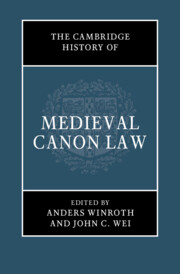Book contents
- The Cambridge History of Medieval Canon Law
- The Cambridge History of Medieval Canon Law
- Copyright page
- Contents
- Figures
- Maps
- Tables
- Contributors
- Acknowledgments
- Abbreviations
- Medieval Canon Law: Introduction
- Part I The History of Medieval Canon Law
- Part II The Sources and Dissemination of Medieval Canon Law
- Part III Doctrine and Society
- Iudicium
- Clerus
- Conubium
- Crimen
- 26 Criminal Law
- 27 Ecclesiastical Discipline: Heresy, Magic, and Superstition
- 28 Just War and Crusades
- 29 Excommunication and Interdict
- Conclusion
- Bibliography of Primary Sources
- Index
- References
28 - Just War and Crusades
from Crimen
Published online by Cambridge University Press: 13 January 2022
- The Cambridge History of Medieval Canon Law
- The Cambridge History of Medieval Canon Law
- Copyright page
- Contents
- Figures
- Maps
- Tables
- Contributors
- Acknowledgments
- Abbreviations
- Medieval Canon Law: Introduction
- Part I The History of Medieval Canon Law
- Part II The Sources and Dissemination of Medieval Canon Law
- Part III Doctrine and Society
- Iudicium
- Clerus
- Conubium
- Crimen
- 26 Criminal Law
- 27 Ecclesiastical Discipline: Heresy, Magic, and Superstition
- 28 Just War and Crusades
- 29 Excommunication and Interdict
- Conclusion
- Bibliography of Primary Sources
- Index
- References
Summary
The basic parameters for the just war, established by Augustine, were just cause, righteous intention, and proper authority. It was Gratian who first gave the concept sustained reflection. Causa 23 of his Decretum was a repository of earlier texts, including Augustine’s, to which he added his own thoughts. He concluded that warfare itself was not a sin, but rather that cruelty, fighting spirit, desire to harm, and libido dominandi were culpable. Gratian stressed the inward attitude of the warrior, particularly his patience, and compared war to paternal love, which corrected with benevolence and benign asperity. The soldier’s duty was obedience to his commanders, and he should be content with his wages and not fight for booty. Peace should be the goal of war, which should be fought only from necessity. Gratian offered the definitions of Isidore of Seville and Augustine before giving his own hybrid definition: a just war was waged by a public authority to avenge injuries. Gratian, however, did not specify the sorts of authorities or injuries.
- Type
- Chapter
- Information
- The Cambridge History of Medieval Canon Law , pp. 537 - 549Publisher: Cambridge University PressPrint publication year: 2022

